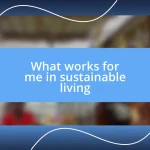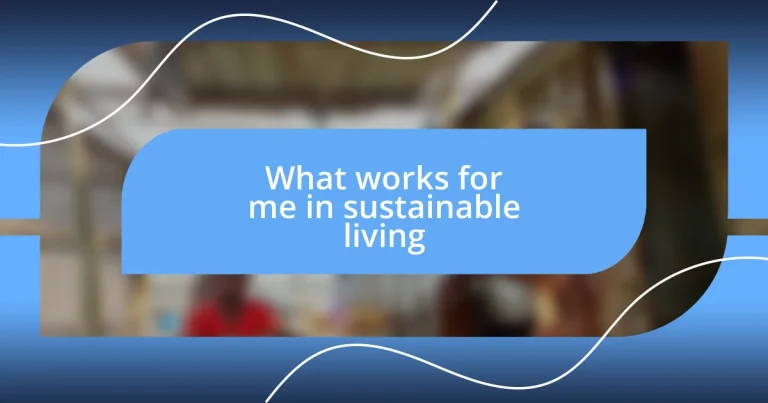Key takeaways:
- Embracing small, consistent changes in daily habits, such as using reusable bags and incorporating plant-based meals, fosters a deeper connection to sustainability and personal empowerment.
- Assessing personal impact on the environment, including tracking water usage and energy consumption, motivates individuals to make significant improvements and prioritize sustainable choices.
- Engaging with the community through initiatives like clean-up days and gardening clubs cultivates a shared passion for sustainability, enhancing social connections and inspiring collective action.
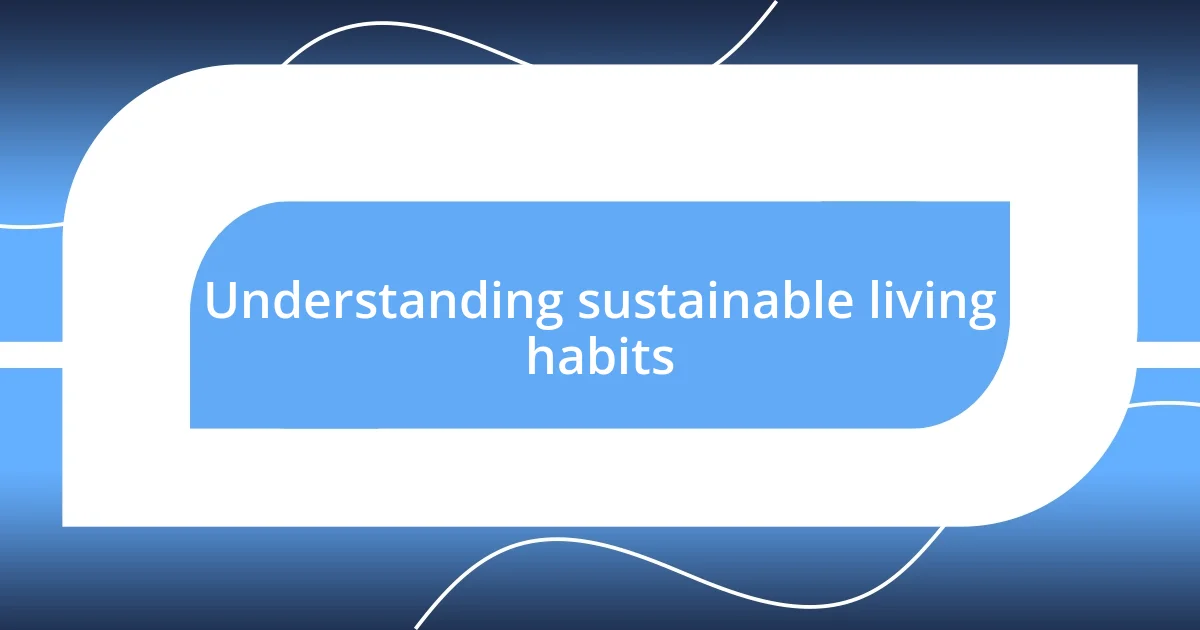
Understanding sustainable living habits
To truly grasp sustainable living habits, it’s essential to reflect on our daily choices and their environmental impact. I remember the first time I switched to a reusable shopping bag; I felt a sense of empowerment, knowing I was reducing waste, even in a small way. Have you ever considered how many single-use bags we accumulate over time?
Building habits around sustainability often starts with small, consistent changes. For instance, incorporating a meatless meal into my weekly routine not only lightened my carbon footprint but also opened my taste buds to a world of flavors. Isn’t it fascinating how a simple dietary switch can lead to creativity in the kitchen and a deeper awareness of food sources?
As I embrace these habits, I’ve noticed the emotional rewards that come with them. Each time I turn off the lights when leaving a room or choose to bike instead of drive, I feel a sense of alignment with my values. Have you felt that thrill of knowing you’re contributing positively, even in these seemingly mundane moments?
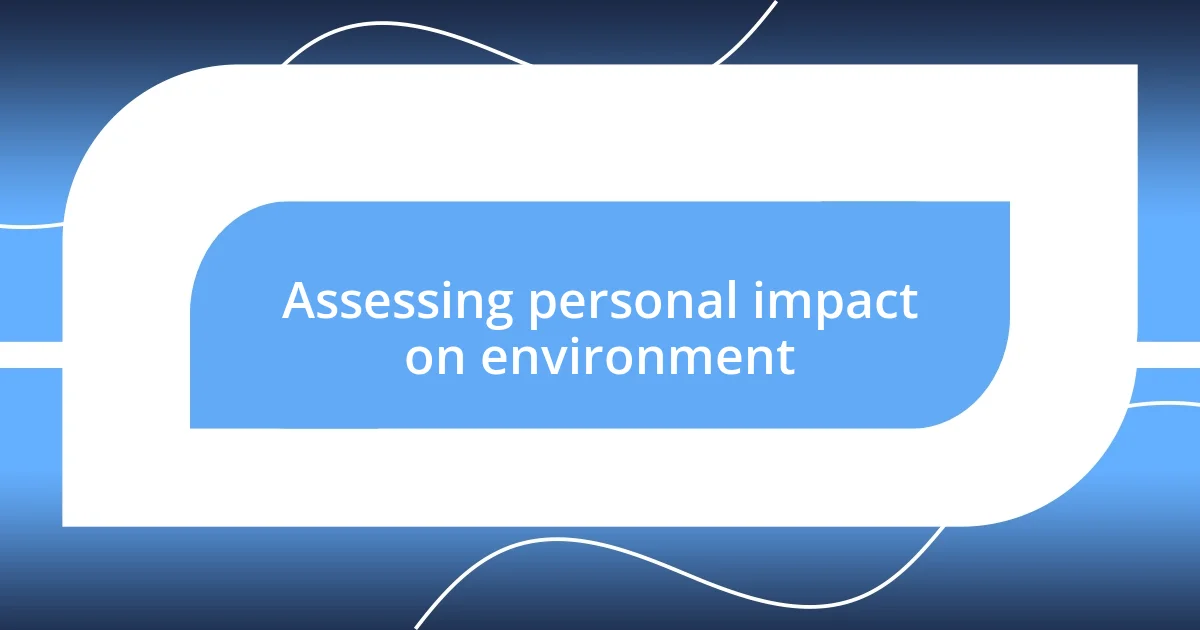
Assessing personal impact on environment
Assessing our personal impact on the environment requires introspection and honestly evaluating our lifestyle choices. When I decided to track my water usage for a month, I was shocked to see how much I wasted during everyday activities like showering or doing laundry. Have you ever taken the time to assess your own water consumption? It can lead to significant changes once you realize where you can improve.
Another area I’ve focused on is my energy consumption. I installed smart meters and noticed my usage patterns changing; turning off unused devices became a more conscious effort. After observing my habits, I’ve made it a challenge to reduce my electricity use by a certain percentage each month. It turns into a fun competition with myself, and the tangible results have motivated me to stick with it.
Finally, I’ve also explored how my shopping habits impact the environment. I shifted to supporting local businesses and choosing sustainable brands to lower the carbon footprint of my purchases. Reflecting on each item I buy gives me a deeper connection to what I consume, and I’ve noticed a significant drop in impulse purchases. This reflective practice allows me to prioritize quality over quantity, and it feels rewarding to invest in sustainable products.
| Personal Impact Aspect | Description |
|---|---|
| Water Usage | Tracking has revealed surprising wastage in daily habits. |
| Energy Consumption | Smart meters changed my usage patterns and provided motivation to reduce it. |
| Shopping Habits | Supporting local and sustainable brands has decreased impulse purchases. |
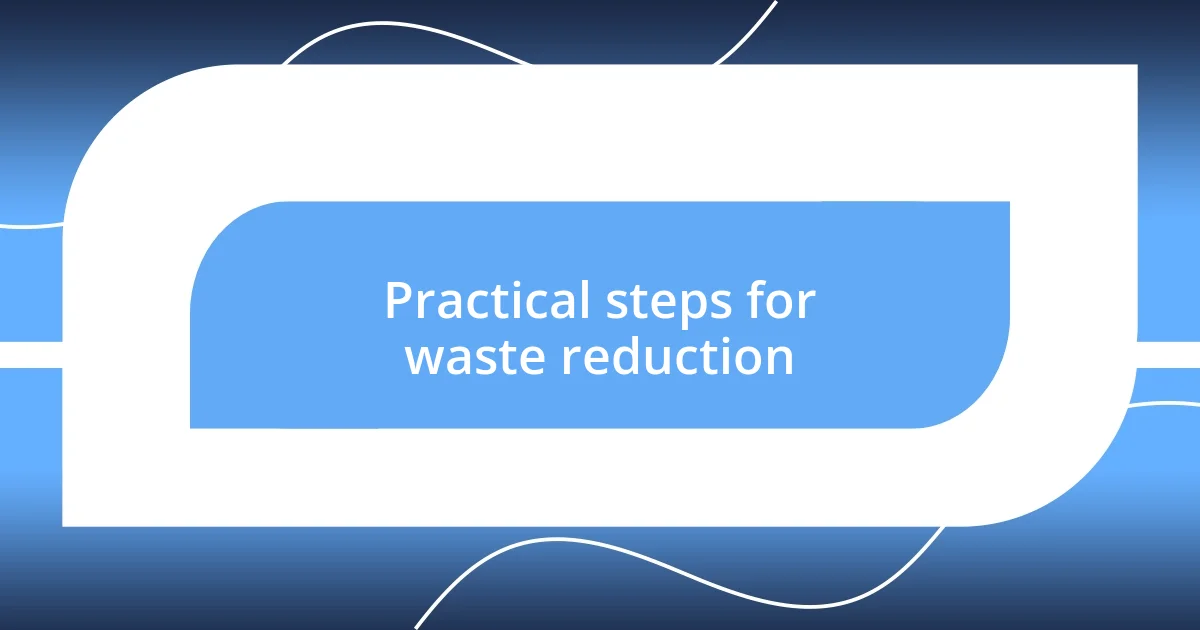
Practical steps for waste reduction
Reducing waste can feel overwhelming, but I’ve found incorporating a few practical steps into my routine can lead to significant changes. For example, I started a compost bin in my kitchen, and it completely transformed my perception of food scraps. The first time I saw rich soil from my kitchen waste, it felt like magic—turning something I’d typically toss in the trash into a resource for my garden was incredibly satisfying.
Here are some simple steps I’ve integrated into my life for waste reduction:
- Use a reusable water bottle: This simple switch not only saves plastic but has also kept me hydrated—a win-win!
- Learn to repair rather than replace: I recently fixed a tear in my favorite shirt, and it was rewarding to save something I loved instead of tossing it.
- Implement a ‘one in, one out’ rule: Whenever I bring home something new, I make sure to donate or recycle an item, keeping my space clutter-free.
- Plan meals effectively: This approach has significantly reduced the amount of food I waste; I’ve become more intentional about what I buy and how I use leftovers.
- Engage in community clean-up days: Participating in local events not only reduces litter but also connects me with like-minded individuals who share my passion for sustainability.
I can’t overstate how rewarding it feels when I see less garbage piling up. Making these small changes has become a point of pride for me—it’s clear that even a little effort can contribute to a larger movement toward sustainability.
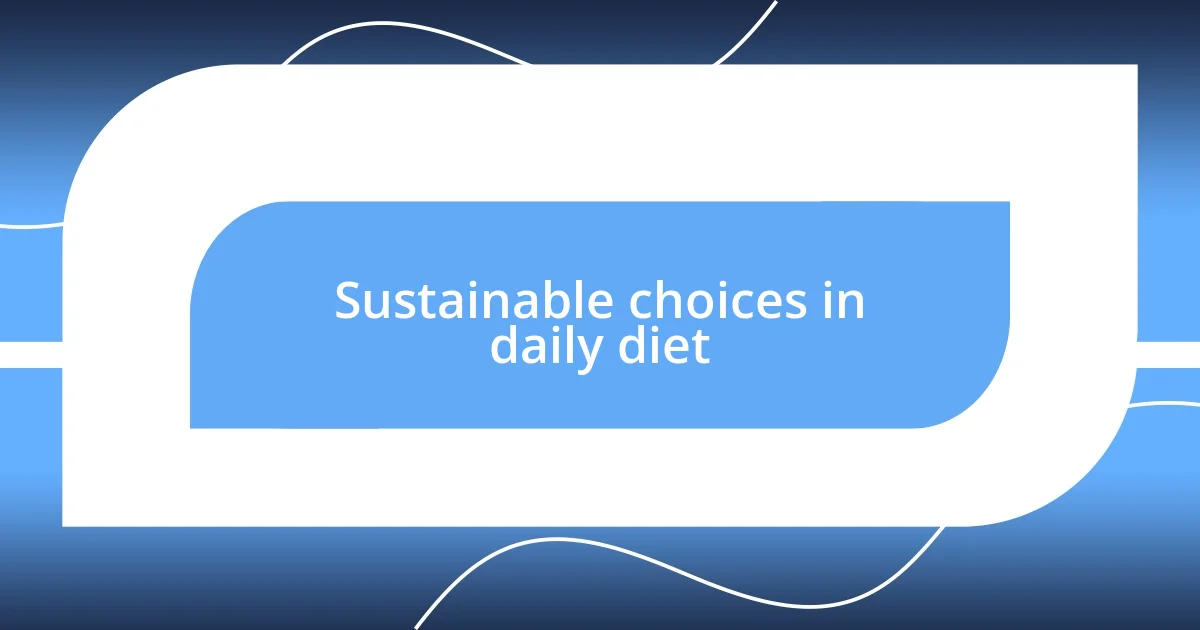
Sustainable choices in daily diet
Eating sustainably has become an integral part of my daily routine. I’ve made it a point to incorporate more plant-based meals into my diet, and honestly, I never realized how enjoyable and satisfying they could be. Have you ever tried swapping out meat for a hearty lentil stew? The flavors are incredible, and it just feels good to know I’m making a positive impact on the planet with every bite.
Another choice I made was to buy seasonal produce from local farmers’ markets. There’s something genuinely special about choosing a ripe, juicy tomato that was picked just hours before. Not only does it support local agriculture, but the taste is vastly superior to anything you might find in a supermarket. I’ve found myself learning new recipes that celebrate the abundance of what’s fresh. It makes cooking feel like an adventure in sustainability.
I also prioritize minimizing food waste by setting aside a day each week for meal prepping. During one particularly busy week, I cooked a large batch of vegetable soup using the odds and ends from my fridge, which usually would have gone uneaten. Not only did I avoid throwing away food, but I also saved time during my hectic workdays, ensuring I had healthy meals ready to go. It’s amazing how small changes can create a ripple effect, making sustainable living feel less like a chore and more like a lifestyle choice that genuinely enhances my day-to-day experience.
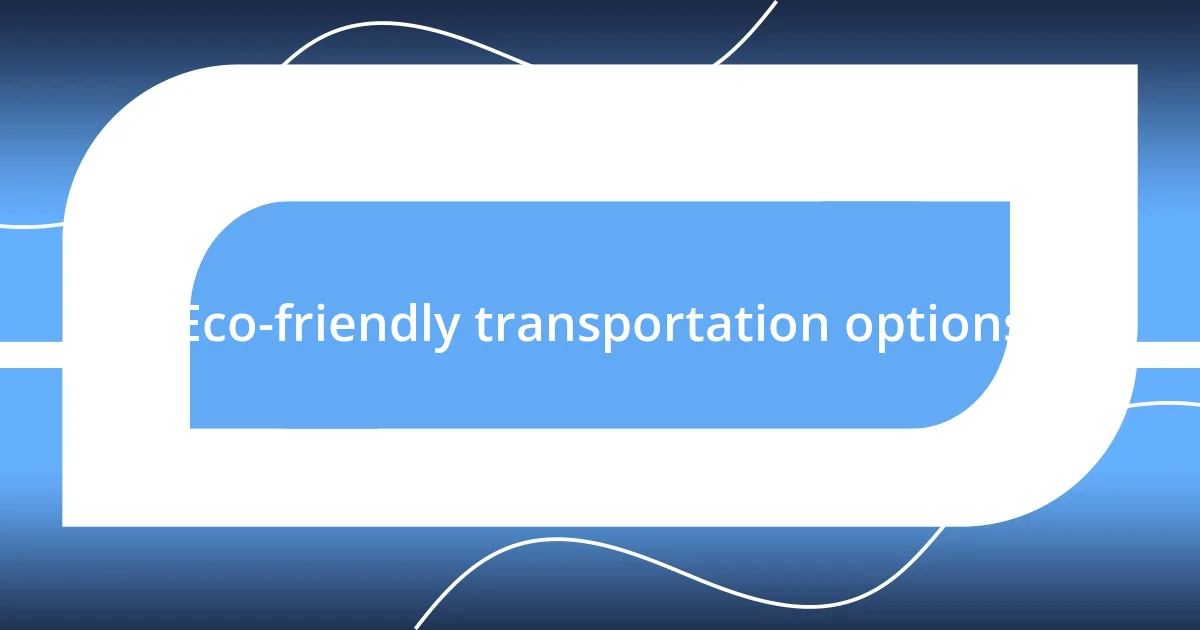
Eco-friendly transportation options
Exploring eco-friendly transportation options has truly been a game-changer for me. When I decided to ditch my car for biking, I felt an overwhelming sense of freedom. Each ride, I not only get to enjoy the fresh air but also contribute to reducing my carbon footprint. Have you ever felt the rush of wind as you pedal down a quiet street? It’s exhilarating and reminds me of the importance of making sustainable choices.
Public transportation is another avenue I’ve embraced. Utilizing the bus or train has opened up a world of connections with my community. I often find myself chatting with interesting people during my daily commutes, turning what used to be a mundane task into an opportunity for engagement. It’s fascinating how a simple shift can create not just convenience but also social interactions that enrich my life.
Carpooling has also become a staple for me. I coordinate rides with colleagues for work events, which makes the experience feel less like a chore and more like a social outing. I appreciate reducing travel costs and emissions, but I didn’t realize how much laughter and conversation could come from sharing a ride. Isn’t it nice to think that such small adjustments can foster camaraderie while caring for our planet?
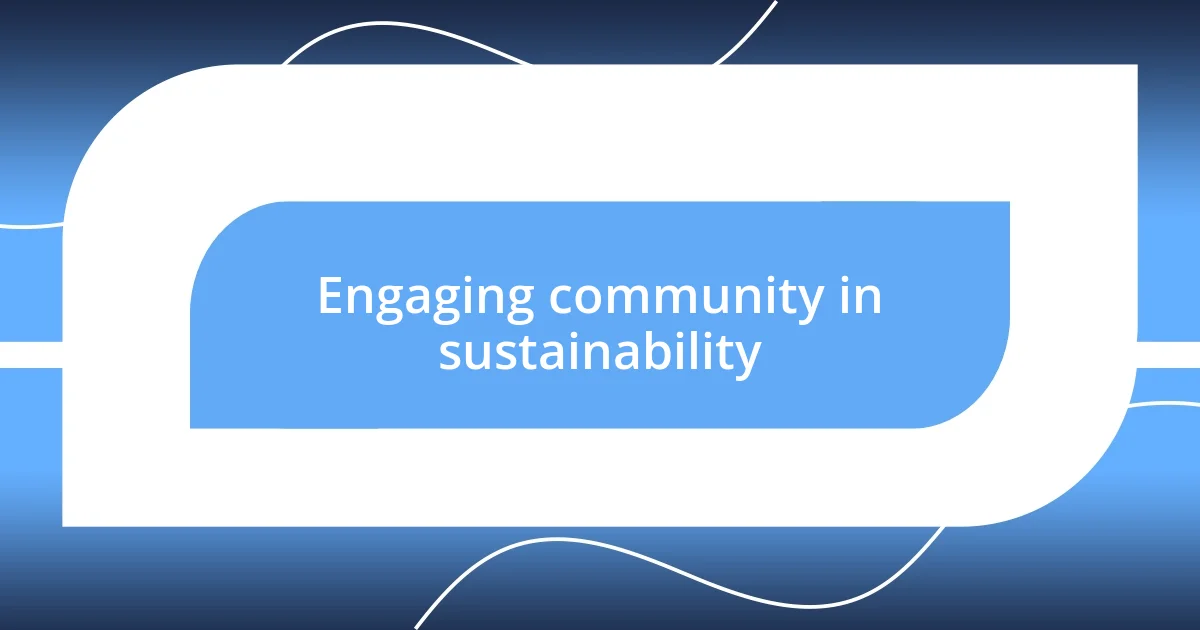
Engaging community in sustainability
Connecting with my community on sustainability has been one of the most rewarding aspects of my journey. I remember hosting a neighborhood clean-up day last spring; the energy was electric as we transformed a neglected park into a vibrant space. There’s something incredibly fulfilling about working shoulder to shoulder with others, don’t you think? It not only brought us together but also sparked conversations about recycling and composting that continue to thrive long after the event.
Another engaging initiative I’ve participated in is a local gardening club. I joined with a desire to learn more about growing my own food, but what I gained was far greater: a network of passionate individuals eager to share tips, seeds, and stories. During our monthly meetups, we not only planted vegetables but also cultivated friendships and a deeper understanding of sustainable practices. It’s powerful to see how a shared goal can unify people from diverse backgrounds, reminding me that sustainability truly blossoms in community.
I’ve also found joy in organizing workshops focused on sustainable living. One memorable session involved teaching kids in my area how to upcycle everyday materials into art. Watching their faces light up with creativity was priceless, and it reaffirmed what I believe: engaging the next generation is crucial. When we actively involve our communities in these conversations, we’re not just sparking interest; we’re planting seeds of awareness that can grow into lifelong habits. Isn’t it inspiring to think about the impact we can have together?
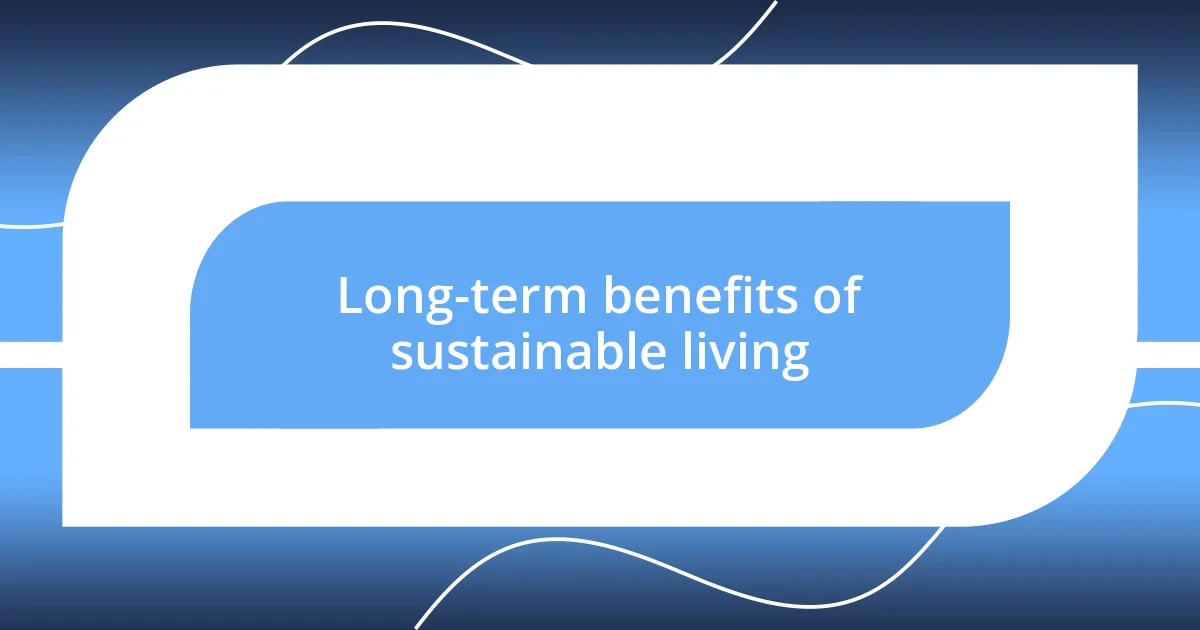
Long-term benefits of sustainable living
The long-term benefits of sustainable living have significantly reshaped my perspective on daily life. For instance, I’ve noticed that by choosing local, organic produce, not only am I supporting small farmers, but I’m also enhancing my health. Eating fresher, chemical-free food has made a noticeable difference in my energy levels and overall well-being. Isn’t it amazing how mindful choices can lead to a healthier lifestyle?
Another aspect I appreciate is the financial savings that come with sustainable practices. Adopting energy-efficient appliances in my home has lowered my utility bills, allowing me to invest in experiences rather than expenses. I vividly remember the first summer after switching to LED lights; I was shocked at the drop in my electric bill. It was like finding extra cash in my pocket! Have you ever considered how some initial investments can yield substantial savings over time?
Lastly, I find that the impact of sustainable living extends beyond just my personal benefits. It fosters a profound sense of legacy for future generations. When I engage in recycling or choose sustainable materials for home projects, I feel like I’m contributing to a healthier planet for my children. Reflecting on this responsibility, it becomes evident that the small steps I take today can create ripples of change for years to come. What better motivation is there than knowing I’m part of something much larger than myself?

